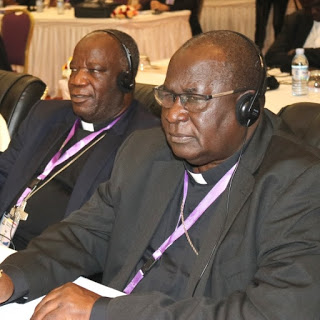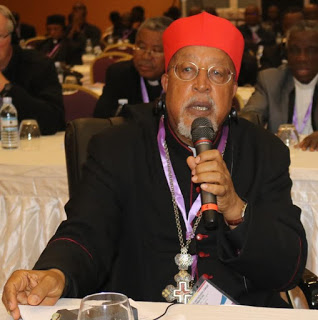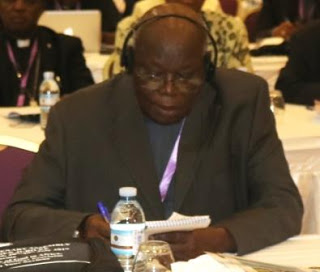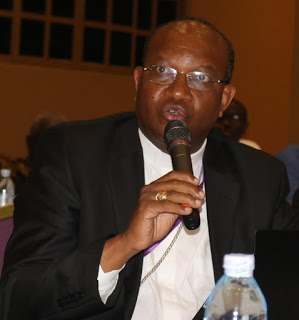UGANDA: AMECEA Region Prioritizes Child Safeguarding, Strengthening of Small Christian Communities as well Interreligious Dialogue

Archbishop Thomas Msusa Vice Chairman of AMECEA (left) and Archbishop Emmanuel Obbo of Tororo, Uganda
As the first session (study session) of the SECAM 18th Plenary Assembly comes to a close and Bishops retreats to the second session (business session), which is closed; the eight regional conferences that makes SECAM have raised pertinent issues, which the Bishops are going to deliberate upon in order come up with resolutions that would empower the Church in Africa to be more effective in its quest for evangelization and integral Human Development.
Child safeguarding, strengthening Small Christian Communities and the issue of inter-religious dialogue comes out strongly as issues pertinent to bishops from the AMECEA Region who are currently participating in the plenary.
“The issues we are bringing to the table for discussions are issues that promote good will and sustains human life; when we do that then we are on the right course,” says Bishop Charles Kasonde, Chairman of AMECEA and Bishop of Solwezi Zambia.
Most Rev. Thomas Msusa, Vice Chairman of AMECEA pointed out that the issue of Small Christian Community as the way and model of the Church in Africa is imp

ortant to focus on because it is at this level of the Church at the grassroots where people are celebrating the sacraments and sharing the word thus promoting interpersonal solidarity. It is therefore important to discuss ways on how to continue promoting Small Christian Communities as a model of Church in Africa.
“As AMECEA we are recognizing the challenge of safeguarding of the minors, children. We accept that Africa has not taken care of her children well. Issues such as child soldiers, child trafficking where children are taken out of their families and are sold elsewhere and the issue of child labor are all prevalent in Africa. We want to look at these as challenges so that the Church in Africa can advocate for ways that would ensure protection of minors against all forms of abuse and deprivations,” Archbishop Msusa of Blantyre Malawi said.
His Eminence Berhaneyesus Cardinal Souraphiel, the Archbishop of Addis Ababa Ethiopia indicated that there is need to consider traditional ways of bringing peace and reconciliation. Referring to the approach of the Holy Father Pope Francis when he met to two leaders of South Sudan at the Vatican and implored them to work for peace and to urgently stop the conflict that is suffocating their young nation of South Sudan, the Holy Father Pope Francis kissed the feet of the two South Sudanese leaders, President Salva Kiir Mayardit and Riek Machar; a humble gesture which according to Cardinal Berhaneyesus has had a great impact on the situation of South Sudan. Such simple, humble gestures need to be reinforced towards bringing peace and reconciliation to the African continent.

Most Rev. John Baptist Odama, the Archbishop of Gulu, expressed that for deeper evangelization in Africa to thrive, the issue of catechists who are the primary agents of evangelization in Africa needs greater attention. They are indelible agents of evangelization ever since the nativity of the Catholic faith in Africa. In places where the ordained minister takes sacraments once a year because of distance, the catechist remains the faithful custodian and points of reference for that particular Christian Community. Additionally, discussions on interreligious dialogue should as well come up a little more strongly because according to Archbishop Odama, this is the avenue through which the tensions among the religious groups can be diffused.
Archbishop Odama also recommended that the issue of war situations in Africa, which have remained persistent should be tackled at the forum and at the end, the Bishops needs to issue an appeal to those in the responsible positions who have been entrusted with political leadership of these countries to become instruments of peace and development as principle priorities. He also emphasized the need to use forums available for African Bishops such as the African Union and other regional positions to ensure that dialogue for peace is bearing visible and sustainable fruits.

For the Archbishop of Nyeri, Kenya, Most Rev. Anthony Muheria, the form of the message that will come out from the deliberations should be more exhortative and perhaps a little more direct to Christian faithful in Africa.
“I feel there should be more emphasis and direct thinking of the faithful from us Bishops of Africa and Madagascar. The message should be direct in exhorting us, more so those Bishops in difficult places and Christians who are under siege; while at the same time appreciating those, who are doing well in the various sectors of Catholic groups, associations, as well as Catholic leaders”. Archbishop Muheria insisted that a more exhortative and direct mode of this message would be meaningful thus responding clearly to the expectations of the Church in Africa and Madagascar.
“We should also thank the Catholics who have been more faithful even in the midst of great difficulties and who often times do not get any positive boost. When we think about the laity, let us not think only about the faithful but the majority who are in the grassroots because they are the ones who lead the faith,” he said.
AMECEA Chairman, Bishop Kasonde said that as AMECEA Region, they are going to wait for the end of the deliberations so that from the resolutions, they will see what priorities they shall focus on. He added that once identified, they will meet as AMECEA Executive board in October to chart the way forward. But already from here they shall itemize and prioritize the issues of AMECEA’s immediate interest.
~End~
By Pamela Adinda


